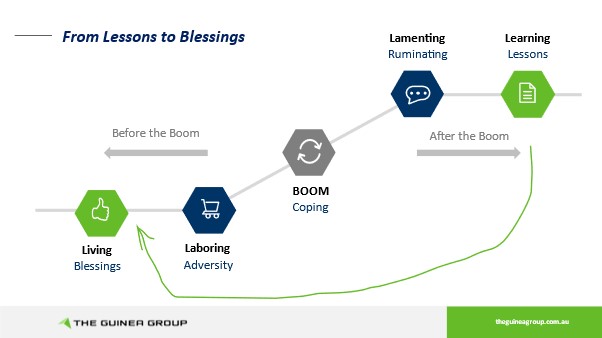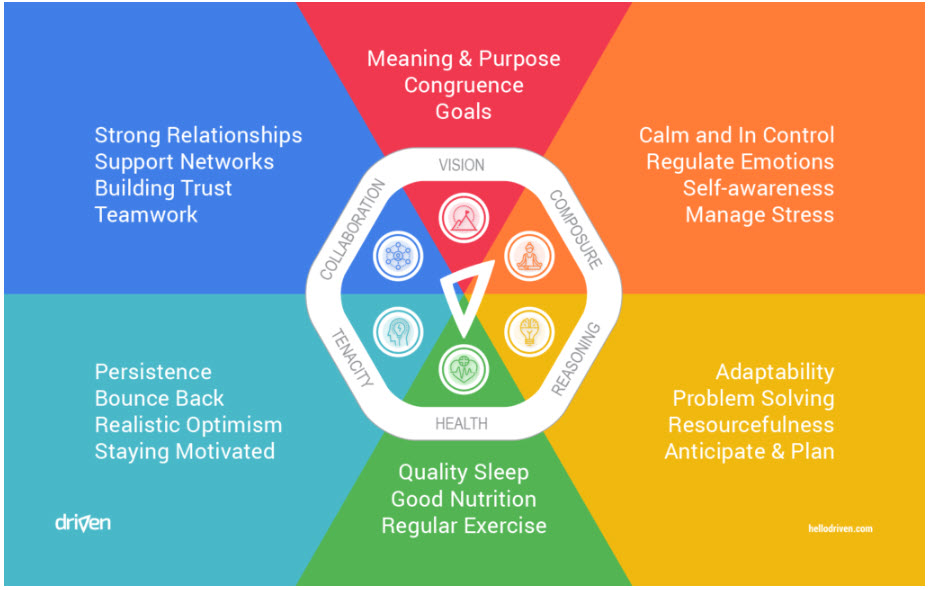Anton Guinea
Entrepreneur, Speaker, bestselling author, and founder of The Guinea Group of Companies. For over 15 years, Anton has helped leaders move their teams to become psychologically safe, physically safe and overall better versions of themselves.

How to be resilient when leading under pressure

Resilience is not just about coping. Resilience is about being ready to cope when you need to. There is a great definition of resilience, from Jurie Rossouw, who defines it as ‘advancing despite adversity’, and I love this take on being resilient.
So, if resilience is about both preparing for a BOOM event, and then advancing through it, what are the skills required at each end of the process? And how do you learn them? Firstly, here is the reliance process in a model (from a slide in our resilience and mental health champion program):

For me, and from lived experience, resilience is about turning life’s lessons into life’s blessings. And working out what you could take from the BOOM even that would set you up for success into the future – aka, if the same thing happened again, how would you deal with it a second time, or a third time?
In short, we go from living to learning, through a five-stage process that starts with living a life of blessing, through the BOOM event, to living a life of learning. And the quicker we can get to the learning stage after the event, the sooner we stop ruminating (or thinking negatively) about what happened. Let’s unpack what you can do before and after the BOOM event, to help you advance despite adversity.
1. Understand your PR6
As a certified Resilience Coach (though Hello Driven), I have been able to learn about both the neurological and the behavioural elements of resilience building. From a skill set perspective, your Personal Resilience 6 are the six life skills that will help you to be prepared for a BOOM event. They include:
- Vision – Having meaning, purpose, congruence, and goals for your life
- Composure – Being calm and in control, with emotional regulation, self-awareness, and stress management
- Reasoning – Adaptability, problem solving, resourcefulness, anticipation, and planning
- Health – Getting quality sleep, eating well, and exercising regularly
- Tenacity – Being persistent, bouncing back, being realistically optimistic, and staying motivated
- Collaboration – Through strong relationships, support networks, and teamwork
Note that a link to Hello Driven in included below in the sources section.
Note also that we can send you a link to complete your resilience profile, and understand ways that you can improve your resilience.
The more you can understand your PR6, you better prepared you will be for any BOOM event.
2. Learn the skill of reframing
Of the PR6 skills that you can develop, prior to a BOOM event, the one that you will rely on following a BOOM, is the skill of reframing. Or rephrasing. Or reprogramming.
For me personally, the ability to reframe is potentially the best and most useful life skill I have learnt in my 49 years on planet earth. By far. This is not the first time that I have said that, and it won’t be the last. But what is reframing? Glad you asked.
Reframing is quite a simple skill (simple, not easy at times), that helps you put a positive spin on any situation or event. It is like finding the silver lining in the dark cloud. It is about focusing on what went right, not what went wrong, and it is about learning from the BOOM event, so that when you talk about it, you talk about it in a positive sense. You talk about it from a philosopher perspective, not a victim perspective, and you get to the point where you can even share those learnings with others, so that they might be better prepared if there were ever to encounter a similar situation.
And reframing is as much about rephrasing as anything else. About the language that you use, both with your inside voice, and with your outside voice. If you check yourself, you will notice that you are using either negative words to explain the event, or you are more positive about it. When you get to that stage, you will know that reframing work is paying off, and that you are starting to look at the event with a different perspective. Which in turn will help you to stop ruminating about it. Winner!
As a side note, people that have been through traumatic BOOM events, and can take the lessons from the event, have been said to demonstrate PTG (post traumatic growth). And of course, there are people who struggle to get through those events, and sadly the result can be PTSD.
3. Know that coping is a necessary part of life
Yes, there are times that you will have to cope. You will have to suffer through some tough times. If you haven’t yet, go you, congrats. They are coming. 1 in 2 people in Australia will suffer through a mental health challenge in their lives.
Coping is a crucial skill. And a skill that we will pick up in another post.
In short, the more resilient you are, the easier it will be to cope with whatever life throws at you!
Want to learn more about how to be more resilient, or want to learn your resilience score?
If you would like to learn more about Anton or The Guinea Group, please click here to book into Anton’s calendar, to:
UPGRADE your Mindset
UPSKILL your Leadership
UPLIFT your Teams
About Anton
Anton has dedicated his working life to helping leaders to upgrade their mindset, upskill their leadership, and uplift their teams! With a focus on helps leaders to better lead under pressure. Anton is an entrepreneur, speaker, consultant, bestselling author and founder of The Guinea Group. Over the past 19 years, Anton has worked with over 175+ global organisations, he has inspired workplace leadership, safety, and cultural change. He’s achieved this by combining his corporate expertise, education (Bachelor of HR and Psychology), and infectious energy levels.
Work With Anton!
Sources: Hello Driven
Subscribe to our Newsletter
